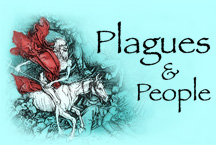
Infectious and Epidemic Disease in History
Department of History
University of California, Irvine
Instructor: Dr. Barbara J. Becker
excerpts from Samuel Pepys' Diary 1665 |

Department of History
University of California, Irvine
Instructor: Dr. Barbara J. Becker
excerpts from Samuel Pepys' Diary 1665 |
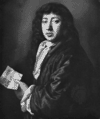
relating primarily to his account of events surrounding the so-called Great Plague of London which began in 1664 and was interrupted by the Fire that destroyed much of the City of London in September 1666 |
|
1665
|
|
|
January
Micrographia (1665) by Robert Hooke |
2. ...to my bookseller's and at his binders
saw Hookes book of the Microscope, which is so pretty that I presently
bespoke it....
9. ...I saw the Royall Society bring their new book, wherein is nobly writ their Charter and laws, and comes to be signed by the Duke as a Fellow; and all the Fellows' hands are to be entered there, and lie as a monument; and the King hath put his with the word "Founder".... 19. ...This day and yesterday, I think it is the change of the weather, I have a great deal of [abdominal] pain, but nothing like what I use to have--I can hardly keep myself loose; but on the contrary, am forced to drive away my pain.... |
| rabbit's foot; a charm worn to prevent colic, perhaps as a symbolic substitute for the use of the herb haresfoot as a purgative | 20. ...So homeward, in my way buying a hare and taking it home--which arose upon my discourse today with Mr. Batten in Westminster-hall--who showed me my mistake, that my hares-foot hath not the joynt to it, and assures me he never had his cholique since he carried it about him. And it is a strange thing how fancy works, for I no sooner almost handled his [the hare's] foot but my belly begin to be loose and to break wind; and whereas I was in some pain yesterday and t'other day, and in fear of more today, I became very well, and so continue.... |
| 21. ...To my office till past 12, and then home to supper and to bed--being now mighty well; and truly, I cannot but impute it to my fresh Hares-Foote. Before I went to bed, I sat up till 2 a-clock in my chamber, reading of Mr. Hookes Microscopicall Observacions, the most ingenious book that ever I read in my life. |
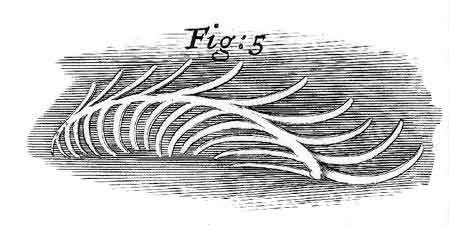
I observed likewise several very pretty varieties of [shapes] in Water
frozen on the top of a broad flat Marble-stone exposed to the cold with
a little Water on it, some like feathers, some of other shapes, many of
them were very much of the shape [shown in Figure 5]
which is extremely different from any of the others.
|
|
February |
6. ...one of the coldest days, all say, they ever felt in England.... | |||
Hooke was Curator of Experiments to the Royal Society. He was described by one contemporary as "The most ill-natured and self-conceited man in the world, hated and despised by most of the Royal Society, pretending to have had all the other inventions when once discovered by their authors to the world" |
15. ...to Gresham College, where I had been by Mr. Povy the last week proposed to be admitted a member; and was this day admitted, by signing a book and being taken by the hand by the President, my Lord Brunkard, and some words of admittance said to me. But it is a most acceptable thing to hear their discourse, and see their experiments; which was this day on fire, and how it goes out in a place where the ayre is not free, and sooner out where the ayre is exhausted, which they showed by an engine on purpose. After this being done, they to the Crown Tavern, behind the Change (Map 1, 5), and there my Lord and most of the company to a club supper; Sir P. Neale, Sir R. Murrey, Dr. Clerke, Dr. Whistler, Dr. Goddard, and others, of the most eminent worth. Above all, Mr. [Robert] Boyle was at the meeting, and above him Mr. [Robert] Hooke, who is the most, and promises the least, of any man in the world that ever I saw. Here excellent discourse till ten at night, and then home.... | |||
|
March
This turns out to have been erroneous; in 1705, Edmund Halley showed that the comets of 1607 and 1682 were, in fact, different apparitions of the same comet, which he predicted would return in 1758. |
1. ...At noon I to dinner at Trinity-house (Map 1, 9)--and thence to Gresham College, where Mr. Hooke read a second very curious Lecture about the late Comett; among other things proving very probably that this is the very same Comett that appeared before in the year 1618, and that in such a time probably it will appear again, which is a very new opinion; but all will be in print. Then to the meeting, where Sir G. Carteret's two sons, his own [Philip Carteret], and Sir N. Slany [Nicholas Slaning, George Carteret's son-in-law], were admitted of the society: and this day I did pay my admission money--40s[hillings]--to the society. Here was very fine discourses--and experiments; but I do lack philosophy enough to understand them, and so cannot remember them.... | |||
| 4. ...This day was proclaimed at
the Change the war with Holland.
17. ...This night my Lady Wood [age 38] died of the small-pox, and is much lamented among the great persons for a good-natured woman and a good wife.... |
||||
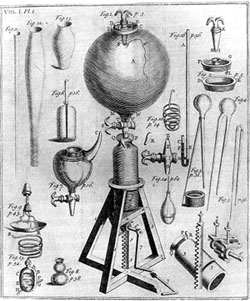
nitric acid |
22. ...Sir Wm. Petty did tell me that in good earnest he hath in his will left some parts of his estate to him that could invent such and such things--as among others, that could discover truly the way of milk coming into the breasts of a woman--and he that could invent proper Characters to express to another the mixture of relishes and tastes. And says, that to him that invents gold, he gives nothing for the Philosopher's stone; "for," says he, "they that find out that, will be able to pay themselfs--but," says he, "by this means it is better than to give to a lecture. For here my executors, that must part with this, will be sure to be well convinced of the invention before they do part with their money."... Then to Gresham College and there did see a kitlin [kitten] killed almost quite (but that we could not quite kill her) with sucking away the Ayre out of a Receiver wherein she was put--and then the ayre being let in upon her, revives her immediately. Nay, and this ayre is to be made by putting together a Liquor and some body that firments--the steam of that doth do the work.... | |||
|
April
an extract of tobacco designed to test the hypothesis that tobacco produces paralysis |
6. ...Great talks of a new Comett--and
it is certain one doth now appear, as bright as the late one at the best;
but I have not seen it myself....
19. ...we to Gresham College--where we saw some experiments up[on] a hen, a dog, and a cat of the Florence poyson. The first [hen] it made for a time drunk, but it came to itself again quickly. The second [dog] it made vomitt mightily, but no other hurt. The third [cat] I did not stay to see the effect of it.... 30. Lords day. ...Great fears of the Sicknesse here in the City, it being said that two or three houses are already shut up. God preserve us all. |
|||
|
May |
1. ...met
my Lord Brunkerd, Sir Robert Murry, Deane Wilkins, and Mr. Hooke, going
by coach to Collonell Blunt's to dinner. So they stopped and took
me with them. Landed at the Tower-wharf (Map
1, 11), and thence by water to Greenwich; and there coaches
met us; and to his house, a very stately seat for situation and brave plantations;
and among others, a Vineyard, the first that ever I did see. No extraordinary
dinner, nor any other entertainment good; but afterwards to the tryall
of some experiments about making of coaches easy [ride smoothly].
And several we tried; but one did prove mighty easy, (not here for me to
describe, but the whole body of the coach lies upon one long spring) and
we all, one after another, rid in it; and it is very fine and likely to
take....
3. ...out to Gresham College and saw a cat killed with the Duke of Florence's poison. And saw it proved that the oyle of Tobacco, drawn by one of the Society, doth the same effect, and is judged to be the same thing with the poison, both in colour and smell and effect. (I saw also an abortive child, preserved fresh in spirit of salt.).... |
|||
| John Evelyn, Pepys' friend and member of the Royal Society | 5. ...After dinner, to Mr. Evelings;
he being abroad, we walked in his garden, and a lovely noble ground he
hath endeed. And among other rarities, a hive of Bees, so, as being
hived in glass, you may see the Bees making their honey and Combs mighty
pleasantly....
24. ...to the Coffee-house, where I have not been a great while--where all the news is of the Dutch being gone out--and of the plague growing upon us in this town and of remedies against it; some saying one thing, and some another.... 28. Lords day. ...my poor Lady who is afeared of the sickness and resolved to be gone into the country, is forced to stay in town a day or two or three about it, to see the event of it. Thence to see my Lady Pen, where my wife and I were shown a fine rarity: of fishes kept in a glass of water, that will live so for ever, and finely marked they are, being foreign..... |
|
June
|
7. ...the hottest day that ever
I felt in my life, and it is confessed so by all other people the hottest
they ever knew in England in the beginning of June.... This day,
much against my will, I did in Drury Lane (Map
2,
5) see two or three houses marked with a red cross
upon the doors, and "Lord have mercy upon us" writ there; which was a sad
sight to me, being the first of the kind that to my remembrance I ever
saw. It put me into an ill conception of myself and my smell, so
that I was forced to buy some roll-tobacco to smell to and chaw--which
took away the apprehension.
8. ...I up, and to the office, where all the morning. I alone at home to dinner, my wife, mother, and Mercer dining at W. Joyces, I giving her a caution to go round by the Half-Moone to his house, because of the plague. I to my Lord Treasurer's, by appointment of Sir Tho. Ingram's, to meet the goldsmiths--where I met with the great news, at last newly come, brought by Bab May from the Duke of Yorke, that we have totally routed the Dutch.... 10. ...In the evening home to supper, and there to my great trouble hear that the plague is come into the City (though it hath these three or four weeks since its beginning been wholly out of the City); but where should it begin but in my good friend and neighbour's, Dr Burnett, in Fanchurch-street: which in both points troubles me mightily. To the office to finish my letters, then home to bed--being troubled at the sickness, and my head filled also with other business enough, and perticularly how to put my things and estate in order, in case it should please God to call me away--which God dispose of to his own glory. 11. Lords day. ...I saw poor Dr Burnets door shut; but he hath, I hear, gained great good-will among his neighbours; for he discovered it himself first, and caused himself to be shut up of his own accord--which was very handsome.... 15. ...The town grows very sickly, and people to be afeared of it--there dying this last week of the plague 112, from 43 the week before--whereof, one in Fanchurch-street, and one in Broadstreete, by the Treasurer's office. |
|||
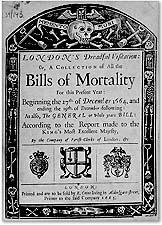
The figures were 112 deaths from the plague during 13-20 June, and 168 deaths during 20-27 June |
17. ...It
struck me very deep this afternoon going with a Hackny-coach from my Lord
Treasurer's down Holborne (Map
2, 4)--the coachman I found to drive easily and easily [slower
and slower], at last stood still, and came down hardly able to stand;
and told me that he was suddenly stroke very sick and almost blind, he
could not see. So I light and went into another coach, with a sad
heart for the poor man and trouble for myself, lest he should have been
stroke with the plague--being at that end of the town that I took him up.
But God have mercy upon us all. Sir Jo. Lawson, I hear, is worse
then yesterday--the King went to see him to-day, most kindly. It seems
his wound is not very bad, but he hath a fever--a thrush, and a Hickup,
all three together; which are, it seems, very bad symptoms.
20. Thankesgiving-day for Victory over the Dutch.... This day I informed myself that there died four or five at Westminster of the plague, in one alley in several houses upon Sunday last--Bell-Alley, over against the Palace-gate. Yet people do think that the number will be fewer in the town then it was the last week.... |
|||
| 21. ....homewards, and to the Crosse
Keys at Cripplegate (Map
2, 2), where I find all the town almost going out of town, the
coaches and waggons being all full of people going into the country....
22. Up pretty betimes, and in great pain whether to send my mother into the country today or no, I hearing by my people that she, poor wretch, hath a mind to stay a little longer; and I cannot blame her, considering what a life she will, through her own folly, lead when she comes home again; unlike the pleasure and liberty she hath had here. At last I resolved to put it to her, and she agreed to go, so I would not oppose it because of the sickness in the town, and my intentions of removing my wife.... So I to my office and left my wife and people to see her out of town, and I at the office all the morning. At noon my wife tells me that she is with much ado gone, and I pray God bless her. But it seems she was to the last unwilling to go; but would not say so.... |
||||
| City regulations required any hackney-coach that had carried a plague victim to be aired afterwards for 5-6 days; special pest-coaches were also used. | 23. ...home by hackney-coach;
which is become a very dangerous passage now-a-days, the sickness encreasing
mightily....
26. ...The plague encreases mightily--I this day seeing a house, at a bittmakers over against St. Clements Church (Map 2, 6), in the open street, shut up; which is a sad sight. 28. ...I whiled away some time in Westminster hall (Map 2, 7) ... in my way observing several plague-houses in Kings-street and the Palace.... |
|||
|
The 267 were plague victims only; the death tolls for the week of all causes was 684. |
29. Up, and by water to White-hall (Map 2, 8), where the Court full of waggons and people ready to go out of town.... This end of the town every day grows very bad of the plague. The Mortality bill is come to 267--which is about 90 more than the last; and of these, but 4 in the City--which is a great blessing to us.... Took leave again of Mr. Coventry, though I hope the Duke is not gone to stay,--and so do others too. So home, calling at Somersett-house (Map 2, 3), where all were packing up too; the Queene-mother setting out for France this day to drink Bourbon waters this year, she being in a consumption--and entends not to come till winter come twelvemonths.... | |||
| Tangier was a seaport/territory strategically located on the African coast of the Strait of Gibraltar. Under Portuguese control from 1471, its rule was transferred to England in 1660. In November 1662, King Charles II created a Commission for the Affairs of Tangier to which Pepys was named. On 20 April 1665, Pepys was elevated to the post of Treasurer of the Commission. | 30. ...Thus this book of two years ends. Myself and family in good health, consisting of myself and wife--Mercer, her woman--Mary, Alice, and Sue, our maids; and Tom, my boy. In a sickly time, of the plague growing on. Having upon my hands the troublesome care of the Treasury of Tanger, with great sums drawn upon me, and nothing to pay them with. Also the business of the office great. Consideration of removing my wife to Woolwich. She lately busy in learning to paint, with great pleasure and successe. All other things well; especially a new interest I am making, by a match in hand between the eldest son of Sir G Carteret, and my Lady Jemimah Montagu.... |
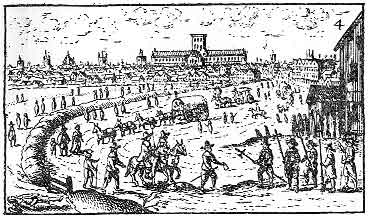
|
|
July |
1. ...Sad
at the news that seven or eight houses in Bazing-hall street, are shut
up of the plague.
3. ...and so home, resolving from this night forward to close all my letters if possible and end all my business at the office by daylight, and I shall go near to do it and put all my affairs in the world in good order, the season growing so sickly that it is much to be feared how a man can scape having a share with others in it--for which the good Lord God bless me or to be fitted to receive it. So after supper to bed, and mightily troubled in my sleep all night with dreams of Jacke Cole my old school-fellow, lately dead, who was born at the same time with me, and we reckoned our fortunes pretty equal. God fit me for his condition. 5. ...walked round to Whitehall, the park being quite locked up. And I observed a house shut up this day in the Pell Mell, where heretofore in Cromwells time we young men used to keep our weekly clubs. And so to Whitehall to Sir G. Carteret, who is come this day from Chatham; and mighty glad he is to see me, and begun to talk of our great business of the match [wedding]--which goes on as fast as possible.... I by water to Woolwich, where I found my wife come and her two maids, and very prettily accommodated they will be. And I left them going to supper, grieved in my heart to part with my wife, being worse by much without her, though some trouble there is in having the care of a family at home in this plague time.... Late home and to bed--very alonely. 6. ...by coach to several places, among others to see my Lord Brunkerd, who is not well but was at rest when I came. I could not see him, nor had much mind, one of the great houses within two doors of him being shut up; and Lord, the number of houses visited, which this day I observed through the town, quite round in my way by Long Lane and London Wall.... 9. Lords day. ...I took occasion to have much discourse with Mr. Ph[ilip] Carteret [the bridegroom-to-be], and find him a very modest man; and I think verily of mighty good nature, and pretty understanding.... In this parish of Michells Cornhill, one of the middle-most parishes and a great one of the town, there hath, notwithstanding this sickliness, been buried of any disease, man, woman, or child, not one for thirteen months last past; which very strange. And the like in a good degree in most other parishes, I hear, saving only of the plague in them. But in this, neither the plague nor any other disease.... |
|
in 1647, when 3597 victims died |
12. ...a
solemn fast-day for the plague growing upon us.
13. ...Above 700 died of the plague this week. 18. ...I was much troubled this day to hear at Westminster how the officers do bury the dead in the open Tuttle-fields (Map 3, 9), pretending want of room elsewhere; whereas the New-Chapel church-yard was walled in at the public charge in the last plague-time, merely for want of room, and now none but such as are able to pay dear for it can be buried there. |
|
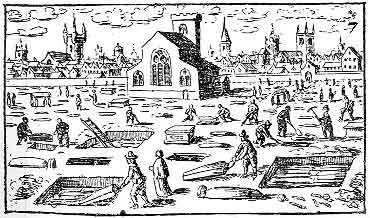
|
||
| July 11-18 | 20. ...walked to Redriffe, where
I hear the sickness is, and endeed is scattered almost everywhere--there
dying 1089 of the plague this week. My Lady Carteret did this
day give me a bottle of plague-water [to take] home with me.... I
received yesterday a letter from my Lord Sandwich [father
of the bride-to-be], giving me thanks for my care about their marriage
business, and desiring it to be despatched, that no disappointment may
happen therein....
21. ...late at my Chamber, setting some papers in order, the plague growing very raging, and my apprehensions of it great. 22. ...to Fox-hall, where to the Spring-garden; but I do not see one guest there--the town being so empty of anybody to come thither--only, while I was there, a poor woman came to scold with the maister of the house that a kinswoman, I think, of hers, that was newly dead of the plague, might be buried in the churchyard; for, for her part, she should not be buried in the Commons as they said she should.... I by coach home, not meeting with but two coaches, and but two carts from Whitehall to my own house--that I could observe--and the streets mighty thin of people. I met this noon with Dr. Burnett, who told me, and I find the news-book this week that he posted upon the Change, that whoever did spread that report that instead of the plague, his servant was by him killed, it was forgery; and showed me the acknowledgment of the maister of the Pest-house that his servant died of a Bubo on his right groine, and two Spots on his right thigh, which is the plague.... |
|
|
Secretary at War
one of the crowded western out-parishes |
25. ...At noon to the Change, which was very thin; and thence homeward and was called in by Mr. Rawlinson, with whom I dined, and some good company, very harmlessly merry. But sad the story of the plague in the City, it growing mightily. This day my Lord Bruncker did give me Mr Grant's book upon the Bills of Mortality, new-printed and enlarged. Thence to my office awhile, full of busines; and thence by coach to the Duke of Albemarle's, not meeting one coach going nor coming from my house thither and back again, which is very strange. One of my chief errands was to speak to Sir W. Clerke about my wife's brother, who importunes me.... But I can do little for him there as to imployment in the army ... and let[ting] him come often to me is troublesome, and dangerous too, he living in the dangerous part of the town.... | |
| 26. ...Sad news of the death of so many in the parish of the plague, 40 last night--the bell always going.... I home to set my Journall for these four days in order, they being four days of as great content and honour and pleasure to me as ever I hope to live or desire or think anybody else can live. For methinks if a man could but reflect upon this, and think that all these things are ordered by God Almighty to make me contented, and even this very marriage now on foot is one of the things entended to find me content in in my life and matter of mirth, methinks it should make one mightily more satisfied in the world then he is.... The Sickness; is got into our parish this week, and is got endeed, everywhere, so that I begin to think of setting things in order, which I pray God enable me to put, both as to soul and body. | ||
|
1843 died of the plague during the week 18-25 July |
27. ...At home met the weekly Bill,
where above 1000 encreased in the Bill, and of them, in all about
1700 of the plague--which hath made the officers this day resolve of sitting
at Deptford, which puts me to some consideration what to do.
28. ...Set out with my Lady [Sandwich] all alone with her with six horses to Dagenhams, going by water to the Ferry. And a pleasant going, and a good discourse--and when there, very merry, and the young couple now well acquainted. But Lord, to see in what fear all the people here do live would make one mad. They are afeared of us that come to them, insomuch that I am troubled at it and wish myself away. But some cause they have, for the Chaplain, with whom but a week or two ago we were here mighty high disputing, is since fallen into a fever and dead, being gone hence to a friend's a good way off--a sober and a healthful man. These considerations make us all hasten the marriage; and resolve it upon Monday next.... 29. ...At noon to dinner, where I hear that my Will is come in thither and laid down upon my bed, ill of the head-ake; which put me into extraordinary fear, and I studied all I could to get him out of the house, and set my people to work to do it without discouraging him.... And so by coach to Kate Joyces.... I took my leave of them, believing that it is great odds that we ever all see one another again--for I dare not go any more to that end of the town.... [T]o bed--in some ease of mind that Will is gone to his lodging and that he is likely to do well, it being only the head-ake. 30. Lords day. ...Will was with me today and is very well again. It was a sad noise to hear our Bell to toll and ring so often today, either for death or burials; I think five or six times. 31. [On the way to the wedding.] ...Anon the coach comes--in the meantime there coming a citizen thither with his horse to go over, that told us he did come from Islington this morning, and that Proctor the vintener of the Miter in Woodstreet, and his son, is dead this morning there--of the plague. He having laid out abundance of money there--and was the greatest vintener for some time in London for great entertainments. We ... met them [the wedding party] coming from church.... So to dinner, and very merry we were.... Thus I ended this month with the greatest joy that ever I did any in my life, because I have spent the greatest part of it with abundance of joy, and honour, and pleasant Journys and brave entertainments, and without cost of money. And at last live to see the business ended with great content on all sides.... Thus we end this month, as I said, after the greatest glut of content that ever I had; only, under some difficulty because of the plague, which grows mightily upon us, the last week being about 1700 or 1800 of the plague.... |
|
|
August
for the week 25 July-1 August there were 3014 burials altogether |
2. Up, it being a public fast,
as being the first Wednesday of the month, for the plague....
3. ...to Dagenham's--all the way people, Citizens, walking to and again to enquire how the plague is in the City this week by the Bill--which by chance at Greenwich I had heard was 2010 of the plague, and 3000 and odd of all diseases; but methought it was a sad question to be so often asked me.... By and by met my Lord Crew returning.... Mr. Marr telling me by the way how a maid-servant of Mr. John Wrights (who lives thereabouts), falling sick of the plague, she was removed to an out-house, and a nurse appointed to look to her--who, being once absent, the maid got out of the house at the window, and run away. The nurse coming and knocking, and having no answer, believed she was dead, and went and told Mr. Wright so; who, and his lady, were in great strait what to do to get her buried. At last resolved to go to Burntwood hard by, being in that parish, and there get people to do it--but they would not; so he went home full of trouble, and in the way met the wench walking over the Common, which frighted him worse then before. And was forced to send people to take her; which he did, and they got one of the pest Coaches and put her into it to carry her to a pest-house. And passing in a narrow lane, Sir Anthony Browne, with his brother and some friends in the coach, met this coach with the Curtains drawn close. The brother being a young man, and believing there might be some lady in it that would not be seen, and the way being narrow, he thrust his head out of his own into her coach to look, and there saw somebody look very ill, and in a sick dress, and stunk mightily; which the coachman also cried out upon. And presently they come up to some people that stood looking after it; and told our gallants that it was a maid of Mr. Wrights carried away sick of the plague--which put the young gentleman into a fright had almost cost him his life, but is now well again.... |
|
|
Partly from the uncertainty of finding of you, and partly from an unwillingness to interrupt your ease unnecessarily, I have hitherto forborne the troubling you with any account of our matters here, which what with the absence of the fleet and the general silence that the present disease puts upon all business, have not been very great since my parting with you at Hampton Court. I have been a good while alone here, the rest having to one place or other provided for themselves out of town. The truth is, few but ticketeers and people of very ordinary errands now come hither, merchants and all persons of better rank with whom we have to deal for provisions and otherwise having left the town; so that I think it will be necessary with respect to them that we remove to some place to which they may be invited to come to us, such as Greenwich or the like. [This suggestion was carried out, and on 16 August, the Navy Office was ordered to be moved to Greenwich.] Be pleased to let his Royal Highness's pleasure be signified herein; for though the removal of my particular papers and business be I think impracticable, and so do purpose myself to trust God Almighty and stay in town, yet I would be glad that we might have some place appointed where my fellow-Officers and those we have to do with may think it safe to continue their meeting, without which the King's business in a little time will be at a very great stand.... |
|
August |
8. ...to my office a little, and then to the Duke of Albemarle's about some business. The streets mighty empty all the way, now even in London, which is a sad sight. And to Westminster hall, where talking, hearing very sad stories from Mrs. Mumford; among others, of Mrs. Michell's son's family. And poor Will that used to sell us ale at the Hall-door--his wife and three children dead, all I think in a day. So home through the City again, wishing I may have taken no ill in going; but I will go, I think, no more thither.... | ||||||||||
| the death toll for 1-8 August was 4030 total, with 2817 of the plague | 10. ...By and by to the office,
where we sat all the morning, in great trouble to see the Bill this
week rise so high, to above 4000 in all, and of them, about 3000 of
the plague. And an odd story of Alderman Bences stumbling at night
over a dead Corps in the street; and going home and telling his wife, she
at the fright, being with child, falls sick and died of the plague....
I to Sir G Smith's to dinner, where very good company and good cheer.
Captain Cocke was there, and Jacke Fenn--but to our great wonder, Alderman
Bence; and tells us that not a word of all this is true, and others said
so too. But by his own story, his wife hath been ill, and he
fain to leave his house and comes not to her--which continued a trouble
to me all the time I was there.... [H]ome, to draw over anew my Will,
which I had bound myself by oath to dispatch by tomorrow night, the town
growing so unhealthy, that a man cannot depend upon living two days to
an end....
12. ...The people die so, that now it seems they are fain to carry the dead to be buried by day-light, the nights not sufficing to do it in. And my Lord Mayor commands people to be within at 9 at night all (as they say) that the sick may have liberty to go abroad for ayre. There is one also dead out of one of our ships at Deptford, which troubles us mightily--the Providence fire-ship, which was just fitted to go to sea. But they tell me today, no more sick on board. And this day W Bodham tells me that one is dead at Woolwich, not far from the Ropeyard. I am told too, that a wife of one of the groomes at Court is dead at Salsbury; so that the King and Queene are speedily to be all gone to Milton. God preserve us. |
||||||||||
|
14. ...Great fears we have that
the plague will be a great Bill this week.
15. ...something put my last night's dream into my head, which I think is the best that ever was dreamed.... But that since it was a dream and that I took so much real pleasure in it, what a happy thing it would be, if when we are in our graves (as Shakespeer resembles it), we could dream, and dream but such dreams as this--that then we should not need to be so fearful of death as we are this plague-time.... It was dark before I could get home, and so land at churchyard-stairs, where, to my great trouble, I met a dead Corps, of the plague, in the narrow ally just bringing down a little pair of stairs--but I thank God I was not much disturbed at it. However, I shall beware of being late abroad again. 16. ...to the Exchange, which I have not been a great while. But Lord, how sad a sight it is to see the streets empty of people, and very few upon the Change--jealous of every door that one sees shut up, lest it should be the plague--and about us, two shops in three, if not more, generally shut up.... This day I had the ill news from Dagenhams, that my poor Lord of Hinchingbrooke, his indisposition is turned to the Small-pox. Poor gentleman, that he should be come from France so soon to fall sick, and of that disease too.... |
||||||||||
|
torch |
20. Lords day. ...to Brainford; and there at the Inn that goes down to the water-side, I light and paid off my post-horses; and so slipped on my shoes, and laid my things by, the tide not serving, and to church--where a dull sermon, and many Londoners. After church to my Inn, and eat and drank, and so about 7 a-clock by water, and got between 9 and 10 to Queene hive, very dark--and I could not get my waterman to go elsewhere, for fear of the plague. Thence with a lanthorn, in great fear of meeting of dead corses, carrying to be buried; but, blessed be God, met none, but did see now and then a Linke (which is the mark of them) at a distance.... | ||||||||||
| 21. ...I was forced to walk [from
John Mennes's house in Greenwich to Woolwich] in the dark, at 10 a-clock
at night, with Sir J. Mennes's George with me--being mightily troubled for
fear of the Doggs at Coome farme, and more for fear of rogues by way, and
more because of the plague which is there (which is very strange, it being
a single house all alone from the town; but it seems they use to admit
beggars (for their own safety) to lie in their barns, and they brought
it to them)....
22. ...I [left Woolwich] and walked to Greenwich, in my way seeing a coffin with a dead body therein, dead of the plague, lying in an open close belonging to Coome farme, which was carried out last night and the parish have not appointed any body to bury it--but only set a watch there all day and night, that nobody should go thither or come thence, which is a most cruel thing--this disease making us more cruel to one another than we are [to] dogs.... [W]alked to Redriffe, troubled to go through the little lane where the plague is; but did, and took water and home--where all well.... |
|||||||||||
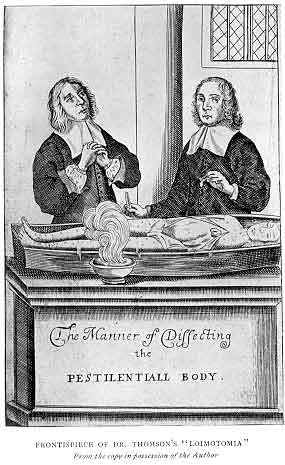
|
|||||||||||
| Burnett may have been the victim of a streptococcal infection. However, he and others died shortly after performing an autopsy on the body of a plague victim. | 25. ...This day I am told that Dr. Burnett my physician is this morning dead of the plague--which is strange, his man dying so long ago, and his house this month open again. Now himself dead--poor unfortunate man. | ||||||||||
| August 25. Letter from Samuel Pepys
to Sir William Coventry
Little till now occuring to give occasion of writng to you, I forbore to tell you of my receipt of yours of the 14th, wherein nothing commanded answer more than the return of my thanks for the large share you give me of your good wishes, which (I bless God) I yet have the benefit of, though the sickness in general thickens upon us, and particularly upon our neighbourhood. You, Sir, took your turn at the sword; I must not therefore grudge to take mine at the pestilence. |
|
August |
28. Up; and
being ready, I out to Mr. Colvill the goldsmith's, having not for some
days been in the streets. But now, how few people I see, and those
walking like people that had taken leave of the world.... I to the
Exchange, and I think there was not 50 people upon it and but few more
like to be.... Thus, I think to take Adieu today of London streets....
29. ...to Greenwich and called at Sir The[ophilus] Bidulph's, a sober discreet man, to discourse of the preventing of the plague in Grenwich and Woolwich and Deptford, where in every place it appears to grow very great.... 30. ...abroad, and met with Hadly, our Clerke, who, upon my asking how the plague goes, he told me it encreases much, and much in our parish: "For," says he, "there died nine this week, though I have returned but six"--which is a very ill practice, and makes me think it is so in other places, and therefore the plague much greater than people take it to be.... I went forth and walked towards Moorefields (Map 3, 12) to see (God forgive my presumption) whether I could see any dead Corps going to the grave [in the improvised plague-pits there]; but, as God would have it, did not. But, Lord, how everybody's looks and discourse in the street is of death and nothing else, and few people going up and down, that the town is like a place distressed--and forsaken. |
|
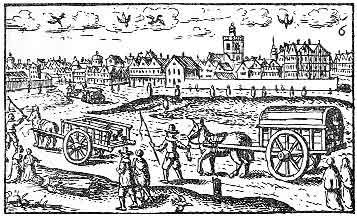
|
||
|
August
this was nearly double the numbers from the previous week |
31. Up, and after putting several things in order to my removal to Woolwich, the plague having a great encrease this week beyond all expectation of almost 2000--making the general Bill 7000, odd 100, and the plague above 6000.... Thus this month ends with great sadness upon the public through the greatness of the plague, everywhere through the Kingdom almost. Every day sadder and sadder news of its encrease. In the City died this week 7496; and of them, 6102 of the plague. But it is feared that the true number of the dead this week is near 10000--partly from the poor that cannot be taken notice of through the greatness of the number, and partly from the Quakers and others that will not have any bell ring for them.... As to myself, I am very well; only, in fear of the plague, and as much of an Ague, by being forced to go early and late to Woolwich, and my family to lie there continually.... | |
|
September
In London, all funeral processions and gatherings were forbidden during the epidemic, regardless of the cause of death. Plague victims were supposed to be buried only between sunset and sunrise, but the shear numbers of deaths made this regulation impossible to enforce. |
3. Lords day. Up,
and put on my colourd silk suit, very fine, and my new periwigg, bought
a good while since, but darst not wear it because the plague was in Westminster
when I bought it. And it is a wonder what will be the fashion after
the plague is done, as to periwigs, for nobody will dare to buy any haire,
for fear of the infection--that it had been cut off the heads of people
dead of the plague.... [M]y Lord Brouncker, Sir J. Mennes, and I
up to the Vestry at the desire of the Justices of the Peace ... in order
to the doing something for the keeping of the plague from growing; but
Lord, to consider the madness of people of the town, who will (because
they are forbid) come in Crowds along with the dead Corps to see
them buried. But we agreed on some orders for the prevention thereof.
Among other stories, one was very passionate methought--of a complaint brought
against a man in the town for taking a child from London from an infected
house. Alderman Hooker told us it was the child of a very able citizen
in Gracious-street, a saddler, who had buried all the rest of his children
of the plague; and himself and wife now being shut up, and in despair of
escaping, did desire only to save the life of this little child; and so
prevailed to have it received stark-naked into the arms of a friend, who
brought it (having put it into new fresh clothes) to Grenwich; where, upon
hearing the story, we did agree it should be permitted to be received and
kept in the town....
4. ...walked home, my Lord Brouncker giving me a very neat Cane to walk with. But it troubled me to pass by Come Farme, where about twenty-one people have died of the plague--and three or four days since I saw a dead corpse in a Coffin lie in the close unburied--and a watch is constantly kept there, night and day, to keep the people in--the plague making us cruel as dogs one to another. |
|
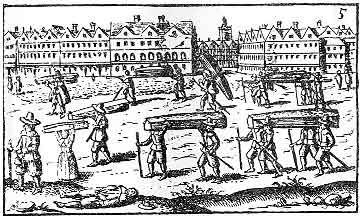 |
||
|
ruts in the road |
5. ...After dinner comes Collonell Blunt in his new Charriott made with Springs, as that was of Wicker wherein a while since we rode at his house. And he hath rode, he says, now this Journy, many mile in it with one horse, and out-drives any coach and out-goes any horse, and so easy he says. So for Curiosity I went into it to try it; and up the hill to the Heath, and over the Cartrutts went to try it, and found it pretty well, but not so easy as he pretends.... | |
|
The City had recently appointed physicians to advise on measures against the plague. The fires were meant to clear the air of infection. |
6. ...to London to pack up more things thence; and there I looked into the street and saw Fires burning in the street, as it is through the whole City, by the Lord Mayors order. Thence by water to the Duke of Albemarles. All the way fires on each side of the Thames; and strange to see in broad daylight two or three Burialls upon the Bankeside, one at the very heels of another--doubtless all of the plague--and yet at least 40 or 50 people going along with every one of them.... | |
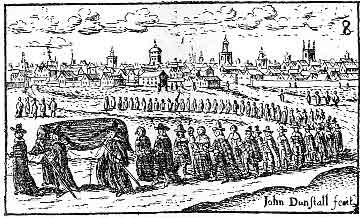
|
||
| 29 August - 5 September | 7. ...to the Tower; and there sent
for the Weekely Bill, and find 8252 dead in all, and of them 6978
of the plague--which is a most dreadfull Number--and shows reason to fear
that the plague hath got that hold that it will yet continue among us....
10. Lords day. Walked home, being forced thereto by one of my watermen falling sick yesterday; and it was God's great mercy I did not go by water with them yesterday, for he fell sick on Saturday night and it is to be feared of the plague. So I sent him away to London with his fellow. But another boat came to me this morning.... [M]y wife ... came out telling me the ill news that she hears, that her father is very ill; and then I told her I feared of the plague, for that the house is shut up. And so, she much troubled, she did desire me to send them something, and I said I would, and will do so.... [T]o Greenwich ... where I find my Lord Brouncker and his mistress, and Sir J. Mennes--where we supped (there was also Sir W Doyly and Mr. Eveling) ... in all my life I never met with so merry a two hours as our company this night was. Among other humours, Mr. Eveling's repeating of some verses made up of nothing but the various acceptations of May and Can, and doing it so aptly, upon occasion of something of that nature, and so fast, did make us all die almost with laughing, and did so stop the mouth of Sir J. Mennes in the middle of all his mirth (and in a thing agreeing with his own manner of Genius) that I never saw any man so out-done, in all my life; and Sir J. Mennes's mirth too, to see himself outdone, was the crown of all our mirth. In this humour we sat till about 10 at night.... 14. ...I did wonder to see the Change so full, I believe 200 people; but not a man or merchant of any fashion, but plain men all. And Lord, to see how I did endeavour all I could to talk with as few as I could, there being now no observation of shutting up of houses infected, that to be sure we do converse and meet with people that have the plague upon them.... [W]hen I came home, I spent some thoughts upon the occurrences of this day, giving matter for as much content on one hand and melancholy on another, as any day in all my life--for the first, the finding of my money and plate, and all safe at London, and speeding in my business of money this day--the hearing of this good news, to such excess after so great a despair of my Lord's doing anything this year--adding to that, the decrease of 500 and more [in the death toll], which is the first decrease we have yet had in the sickness since it begun [during the week 29 August - 5 September, 6988 died of the plague; the next week, 6544 died of plague out of 7690 deaths altogether]--and great hopes that the next week it will be greater. Then, on the other side--my finding that though the Bill in general is abated, yet the City within the walls is encreased and likely to continue so, and is close to our house there--my meeting dead corps's of the plague, carried to be buried close to me at noonday through the City in Fanchurch-street--to see a person sick of the sores, carried close by me by Grace-church in a hackney-coach--my finding the Angell tavern, at the lower end of Tower-hill shut up; and more than that, the alehouse at the Tower-stairs; and more than that, that the person was then dying of the plague when I was last there, a little while ago at night, to write a short letter there, and I overheard the mistress of the house sadly saying to her husband somebody was very ill, but did not think it was of the plague--to hear that poor Payne, my water[man], hath buried a child and is dying himself--to hear that a labourer I sent but the other day to Dagenhams to know how they did there, is dead of the plague; and that one of my own watermen, that carried me daily, fell sick as soon as he had landed me on Friday morning last, when I had been all night upon the water (and I believe he did get his infection that day at Brainford) is now dead of the plague--to hear that Captain Lambert and Cuttle are killed in the taking these ships and that Mr Sidny Montagu is sick of a desperate fever at my Lady Carteret's, at Scott's hall--to hear that Mr. Lewes hath another daughter sick--and lastly, that both my servants, W[ill] Hewers and Tom Edwards, have lost their fathers, both in St. Sepulcher's parish, of the plague this week--doth put me into great apprehensions of melancholy, and with good reason. But I put off the thoughts of sadness as much as I can; and the rather to keep my wife in good heart, and family also.... |
|
|
surgeon |
15. ...I by water to Deptford ... and there drank a cup of good drink (which I am fain to allow myself during this plague time, by advice of all and not contrary to my oath, my physician being dead and Chyrurgeon out of the way whose advice I am obliged to take).... | |
|
The week of 12-19 September was the worst of the whole plague period. |
20. ...But, Lord, what a sad time it is to see no boats upon the River; and grass grows all up and down Whitehall-court (Map 2, 8)--and nobody but poor wretches in the streets. And which is worst of all, the Duke showed us the number of the plague this week, brought in the last night from the Lord Mayor--that it is encreased about 600 more then the last, which is quite contrary to all our hopes and expectations from the coldness of the late season: for the whole general number is 8297; and of them, the plague 7165--which is more in the whole, by above 50, then the biggest Bill yet--which is very grievous to us all.... | |
| 24. Lords day. ...I
in the cabin to writing down my journall for these last seven days, to
my great content--it having pleased God that in this sad time of the plague,
everything else hath conspired to my happiness and pleasure, more for these
last three months then in all my life before in so little time. God
long preserve it, and make me thankful for it....
25. Found ourselfs come to the fleet; and so aboard the Prince, and there, after a good while in discourse, we did agree a bargain of 5000l [5000 pounds] for my Lord Sandwich, for silk, cinnamon, nutmegs, and Indico.... In our way I was [surprised], and so we were all, at the strange nature of the Sea-water in a dark night; that it seemed like fire [bioluminescence] upon every stroke of the Oare--and they say is a sign of Winde.... |
||
| Death tolls from the plague for the week 19-26 September numbered 5533. | 27. ...I saw this week's Bill
of Mortality, wherein, blessed be God, there is above 1800 decrease,
being the first considerable decrease we have had....
29. ...I hear for certain this night upon the road, that Sir Martin Noell is this day dead of the plague in London, where he hath lain sick of it these eight days. 30. ...I do end this month with the greatest content, and may say that these last three months, for joy, health and profit, have been much the greatest that ever I received in all my life in any twelve months almost in my life--having nothing upon me but the consideration of the sickliness of the season during this great plague to mortify mee. For all which, the Lord God be praised. |
|
|
October |
3. ...This night I hear that of our two watermen that used to carry our letters, and were well on Saturday last, one is dead, and the other dying, sick of the plague--the plague, though decreasing elsewhere, yet being greater about the Tower and thereabouts. | |
| The local death toll went from 11 to 19 | 4. ...This night comes Sir George
Smith to see me at the office, and tells me how the plague is decreased
this week 740, for which God be praised--but that it encreases at our end
of the town still....
7. ...Did business, though not much, at the office, because of the horrible Crowd and lamentable moan of the poor seamen that lie starving in the streets for lack of money--which doth trouble and perplex me to the heart.... |
|
| 4327 compared to 4909 | 12. ...Good news this week that
there are about 600 less dead of the plague than the last....
16. ...I walked to the Tower. But, Lord, how empty the streets are, and melancholy, so many poor sick people in the streets, full of sores; and so many sad stories overheard as I walk, everybody talking of this dead, and that man sick, and so many in this place, and so many in that. And they tell me that in Westminster there is never a physitian, and but one apothecary left, all being dead--but that there are great hopes of a great decrease this week: God send it. At the Tower found my Lord Duke and Duchesse at dinner; so I sat down. And much good cheer, the Lieutenant and his lady, and several officers with the Duke. But, Lord, to hear the silly talk was there, would make one mad--the Duke having none almost but fools about him.... 26. ...I to the Change--where I hear how the French have taken two and sunk one of our Merchant-men in the Streights, and carried the ships to Toulon.... The Change pretty full, and the town beings to be lively again--though the streets very empty, and most shops shut.... |
|
This was a decrease of 390 in deaths from the plague. |
29. Lords day. ...in
the street did overtake and almost run upon two women, crying and carrying
a man's Coffin between them. I suppose the husband of one of them,
which methinks is a sad thing....
31. ...Sir W Batten met me and did tell me that Captain Cockes black was dead of the plague--which I had heard of before but took no notice.... [M]eeting yesterday the Searchers with their rods in their hands coming from his house, I did overhear them say that the fellow did not die of the plague. But he had I know been ill a good while, and I am told that his boy Jacke is also ill.... Thus we end the month. The whole number of deaths being 1388, and of them of the plague, 1031.... |
|
|
November
Deaths due to plague for 24-31 October were 1031 compared to 1414 for 31 October-7 November. |
3. ...I hear that one of the little
boys at my lodging is not well, and they suspect, by their sending for
plaster and Fume, that it may be the plague. So I sent Mr.
Hater and W Ewre to speak with the mother--but they returned to me satisfied
that there is no hurt nor danger, but the boy is well and offers to be
searched. However, I was resolved myself to abstain coming thither
for a while....
9. ...The Bill of Mortality, to all our griefs, is encreased 399 this week, and the encrease general through the whole City and suburbs, which makes us all sad.... 14. ...Captain Cocke .... and I in his coach through Kent Streete (a sad place through the plague, people sitting sick and with plasters about them in the street, begging).... |
|
| There were 1050 plague victims during the week of 7-14 November. | 15. ...The plague, blessed be God,
is decreased near 400; making the whole this week but 1300 and odd--for
which the Lord be praised....
16. ...[M]y Lord Bruncker ... and Sir Edmd Pooly carried me down into the Hold of the India Shipp, and there did show me the greatest wealth lie in confusion that a man can see in the world--pepper scatter[ed] through every chink, you trod upon it; and in cloves and nutmegs, I walked above the knees--whole rooms full--and silk in bales, and boxes of Copper-plate, one of which I saw opened.... 20. ...After being very merry and having spent a piece, I took horse, and by another way met with a very good road; but it rained hard and blew, but got home very well. Here I find Mr. Deering come to trouble me about business--which I soon despatched; and parted, he telling me that [his clerk, Peter] Luellin hath been dead this fortnight of the plague in St. Martin's lane--which much surprized me. |
|
| The overall death toll for 14-21 November was 905, with 652 due to plague. | 21. ...I heard this day that Mr.
Harrington is not dead of the plague as we believed; at which I was very
glad--but most of all to hear that the plague is come very low; that
is, the whole under 1000, and the plague 600 and odd--and great hopes of
a further decrease, because of this day's being a very exceeding hard frost--and
continues freezing....
24. Up, and after doing some business at the office, I to London; and there in my way, at my old Oyster-shop in Gracious-streete, bought two barrels of my fine woman of the shop, who is alive after all the plague--which now is the first observation or enquiry we make at London concerning everybody we knew before it. So to the Change, where very busy with several people, and mightily glad to see the Change so full, and hopes of another abatement still the next week.... 30. ...Great joy we have this week in the weekly Bill, it being come to 544 in all, and but 333 of the plague--so that we are encouraged to get to London soon as we can. And my father writes as great news of joy to them, that he saw Yorkes waggon go again this week to London, and was full of passengers--and tells me that my aunt Bell hath been dead of the plague these seven weeks.... |
|
| December 7. Letter from Samuel Pepys
to Sir William Coventry
...This week's decrease [in deaths due to plague] renders it yet more secure to return to London, so that I suppose my brethren will not doubt it. But the warrant may be indefinite, to go as soon as they shall think safe. |
|
December
243 died from plague during the week 5-12 December compared to 210 for the previous week. |
13. ...away to the Change, and there hear the ill news, to my great and all our great trouble, that the plague is increased again this week, notwithstanding there hath been a day or two great frosts; but we hope it is only the effects of the late close warm weather, and if the frost continue the next week, may fall again; but the town doth thicken so much with people, that it is much if the plague do not grow again upon us.... |
| December 14. Letter from Samuel Pepys
to Sir William Coventry
...We are much out of humour upon the increase this week of the Plague, and the more for that in our parish it is risen from one to six, and though one of the least parishes yet hath this week the greatest number within the walls of any. |
|
December
|
20. ...two things trouble me:
one, the sickness is encreased above 80 this week (though in my
own parish, not one hath died, though six the last week); the other most
of all, which is that I have had so complexed an account for these last
two months ... that I have not made even with myself now these three or
four months....
25. Christmas Day. To church in the morning, and there saw a wedding in the church, which I have not seen many a day; and the young people so merry one with another, and strange, to see what delight we married people have to see these poor fools decoyed into our condition, every man and woman gazing and smiling at them.... |
| These are the death tolls for 19-26 December. | 27. ...home to bed--with great content
that the plague is decreased to 152--the whole being but 330....
31. Lords day. ...Thus ends this year, to my great joy, in this manner:-- I have raised my estate from 1300l in this year to 4400l. I have got myself greater interest, I think, by my diligence; and my imployments encreased by that of Treasurer for Tanger and Surveyor of the Victuals. It is true we have gone through great melancholy because of the great plague, and I put to great charges by it, by keeping my family long at Woolwich, and myself and another part of my family, my clerks, at my charge at Greenwich, and a maid at London. But I hope the King will give us some satisfaction for that. But now the plague is abated almost to nothing, and I intending to get to London as fast as I can, my family, that is, my wife and maids, having been there these two or three weeks.... My whole family hath been well all this while, and all my friends I know of, saving my aunt Bell, who is dead, and some children of my Cosen Sarah's, of the plague. But many of such as I know very well, dead. Yet to our great joy, the town fills apace, and shops begin to be open again. Pray God continue the plague's decrease--for that keeps the Court away from the place of business, and so all goes to wrack as to public matters, they at this distance not thinking of it. |
 |
| Go to: |
|
|